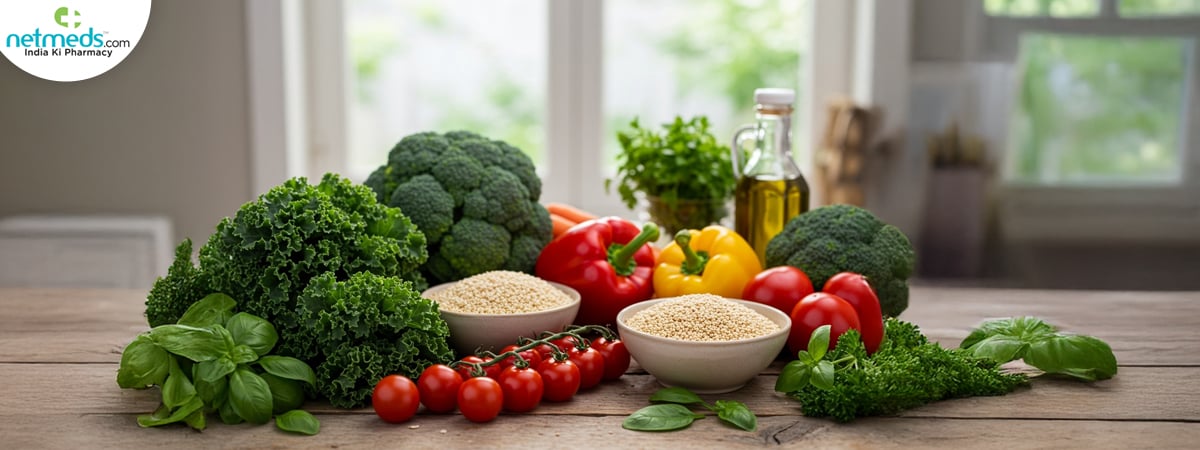Potassium is an essential mineral found abundantly in several foods we eat. This mineral holds a key role in maintaining your heart, nerves, and muscles functioning effectively. But in people with kidney disease, potassium does not filter properly, and excessive levels of potassium in the blood can be dangerous.

A low potassium diet is one where you restrict the intake of foods high in potassium levels. Your healthcare provider may recommend this diet to keep your potassium levels balanced and avert the risk of complications like irregular heartbeats, muscle weakness, or fatigue. This diet is specifically suggested if you have a high level of potassium in your blood (hyperkalaemia) or a chronic disease condition. Moreover, limiting the intake of potassium through food serves as a great way to treat these medical conditions and prevent the risk of other health concerns.
Also Read: Potassium: Functions, Food Sources, Deficiency And Toxicity
Health Benefits of a Low Potassium Diet
Protects Heart Health
Hyperkalaemia or high potassium levels in the blood can strain your heart muscles, resulting in irregular heartbeats or even sudden cardiac arrest. A low potassium diet helps stabilise the heartbeat and regulate blood pressure, thereby optimising heart function.
Supports Kidney Function
When the kidneys struggle to filter out excess potassium, cutting down helps decrease their workload. Thereby prevents potassium buildup and reduces further kidney damage.
Prevents Muscle Weakness / Fatigue
Excess potassium in the blood can interfere with proper muscle and nerve functions. Limiting potassium intake can help maintain normal energy levels and promote muscle strength and proper nerve signalling.
Lowers Risk of Complications
Being mindful of potassium intake, you can prevent serious symptoms like tingling, nausea, and even paralysis that may occur with high potassium levels.
Also Read: Low Sodium Diet: Health Benefits, Foods To Add And Avoid, And Risks
Who Needs A Low Potassium Diet?
Your healthcare provider may restrict your intake of potassium if you have the following medical problems:
Kidney disease
Adrenal insufficiency or Addison's disease
Congestive heart failure
Liver disease
Intake of certain drugs can also make it hard for your body to get rid of extra potassium.
What Does A Low-Potassium Diet Look Like?
Those who are on a low-potassium diet should try to limit their intake to not more than 2000 to 3000 mg of potassium daily. And those without any health conditions can aim to get about 4700 mg of potassium. The appropriate amount usually depends on the height and weight of a person.
Depending on your requirements, a low-potassium diet plan may look like this:
· Fruits 1-3 servings of low-potassium like apples or grapes
· Vegetables 2-3 servings, such as carrots or corn
· Dairy and calcium-rich foods 1-2 servings, like paneer
· Meat/plant-based meat 3-7 servings like turkey or shrimp
· Grains about 4-7 servings, like rice or noodles
Foods to Add
Remember that not all fruits and vegetables are off-limits. The trick is choosing wisely and balancing portions.
Low-Potassium Foods
Fruits like apples, grapes, berries, pineapples, pears, and plums.
Vegetables such as cabbage, cauliflower, cucumber, green beans, lettuce, and onions.
White rice, pasta, bread, especially white or refined ones.
Eggs, chicken, and fish in moderate amounts.
Rice cakes, popcorn, and unsalted crackers.
Pro-Tip: Leeching the vegetables may help to reduce potassium content. The process is simple, just boil vegetables and draining the water can reduce their potassium content further.
Foods to Limit or Avoid
These foods are potassium-rich and can quickly push your levels too high:
Bananas, oranges, mangoes, cantaloupe, and all dried fruits
Potatoes, spinach, tomatoes, mushrooms, and sweet potatoes
Milk, yogurt, and cheese (limit to small portions)
Nuts, beans, lentils, chocolate, and salt substitutes (many contain potassium chloride)
Simple Tips to Follow
A low-potassium diet isn’t about total deprivation; it’s about the right balance and awareness. Here are some practical tips
Read food labels for “processed foods and “low sodium” items, which may sometimes hide potassium additives.
Restrict your fluid intake, water and all other fluids in the meal. For those with kidney issues, follow your healthcare provider's advice on the right amount of fluid intake.
Totally restrict intake of salt substitutes, as most of them contain potassium chloride instead of sodium chloride.
Even low-potassium foods can add up, if consumed in excess amounts, so be mindful of portions.
Regular follow-up with your healthcare provider, get potassium levels tested as advised by your doctor, as this will help you to modify your dietary habits.
Conclusion
A low potassium diet is not about restriction; it’s more about protecting your heart, kidneys, and overall well-being. Generally, this diet is recommended by your health care provider if you have a high level of potassium in your blood or if you have kidney problems. With a little planning, you can still enjoy delicious, colourful and balanced meals, while keeping your health in balance.
(This article is reviewed by Kalyani Krishna, Chief Content Editor)
Author Profile:
M Sowmya Binu
With over 15 years of expertise and a Postgraduate degree in Nutrition, M Sowmya Binu is a seasoned professional in the field of nutrition. Specialising in tailoring personalised diet plans, she underscores the significance of a balanced approach to health, emphasising the integration of medication with dietary intake for holistic wellness. Passionate about equipping individuals with knowledge to make informed decisions, Sowmya adeptly develops insightful content encompassing a wide array of topics, including food, nutrition, supplements, and overall health.
References:
https://www.kidney.org/kidney-topics/potassium-your-ckd-diet
https://www.uptodate.com/contents/low-potassium-diet-beyond-the-basics
https://www.ouh.nhs.uk/media/yevp5xiv/108243potassium.pdf
https://www.niddk.nih.gov/health-information/kidney-disease/chronic-kidney-disease-ckd/healthy-eating-adults-chronic-kidney-disease



 Previous
Previous